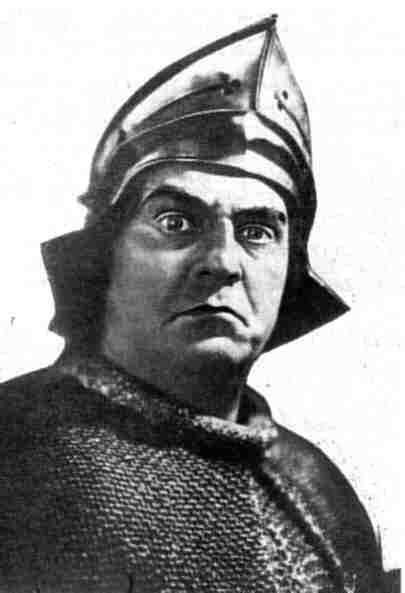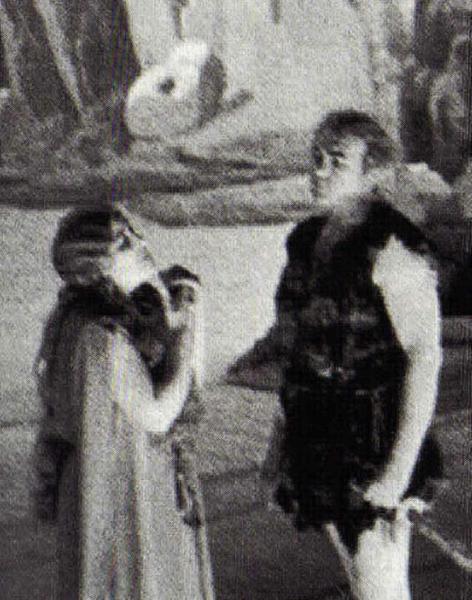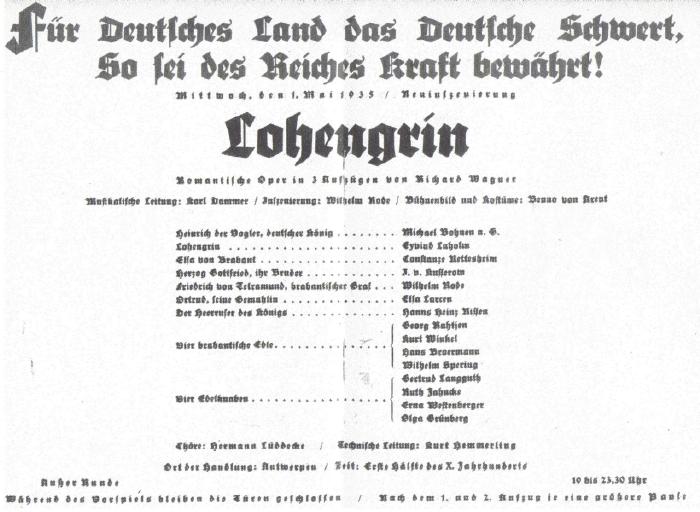Eyvind Laholm
14 October 1894 East Clair (Wisconsin) – 19 July 1958 New York City
Eyvind Laholm as Rienzi
Eyvind Laholm as Siegmund
Lohengrin, Berlin, Deutsche Oper, 1 May 1935
Laholm was born into a family of Swedish origin, his real name was Jon Edwin Johnson. A US marine in World War I, he
studied voice in New York after the war. He began as an operetta singer in the USA. In 1924, he made his operatic debut in
Essen as Canio. From Essen, he moved on to Wiesbaden in 1926, to Stuttgart in 1931 and to Berlin (Deutsche Oper) in 1934.
Regular guest appearances at the Berlin Staatsoper (from 1929) and in Hamburg (1935–39); he further sang at the Vienna
Staatsoper (one single performance in 1935, contrary to what Kutsch & Riemens say), in Stockholm, Antwerp, Liège,
Munich, Frankfurt, Zoppot, Verona, Florence (Maggio Musicale 1938 as Siegmund), Monte Carlo, Barcelona, Belgrade, Bucarest.
In 1939, he was in New York for a successful concert and two Met performances.
He sang primarily Wagner (Lohengrin, Stolzing, Erik, Siegmund, Young Siegfried, Tannhäuser, Parsifal, Rienzi), but also
Max, Königssohn, Manrico, Riccardo, Alvaro, Otello, Arnold, Gounod's Faust, Pollione, Števa, Benvenuto Cellini
(by Berlioz) or Pedro.
Despite his evident Nazi leanings (it was very, very unusual for a foreigner to record for a department of the Nazi party,
see the below discography), he seems to have returned to America in 1942.
Reference 1: Kutsch & Riemens; reference 2: Vienna Staatsoper archives
Source for the recording
Discography
Odeon, Berlin, 29 April 1936
PBe11329 Un ballo in maschera: O sag, wenn ich fahr' O-25763, Parlophone R2487
PBe11330 Un ballo in maschera: Doch heißt dich auch ein Pflichtgebot O-25763
Odeon, Berlin, May 1936
PBe11339 Otello: Gott! Warum hast du gehäuft O-25835, Decca G-20452A
PBe11340 Fidelio: In des Lebens Frühlingstagen O-25835, Decca G-20452B, Parlophone R2487
Odeon, Berlin, December 1936
Nsk16 All mein' Gedanken (Brahms) (w. Heidersbach) NSKG A2
Nsk17 Heimliche Liebe (trad) (w. Heidersbach) NSKG A2
NSKG means Nationalsozialistische Kulturgemeinde - a body within the Nazi party responsible for the ideological
advancement of the Nazi cultural policy. Its head was the dreaded fanatic Alfred Rosenberg.
Live
Die Meistersinger von Nürnberg – excerpts with Lehmann, Hoffmann, Wernigk, Thorborg and Weingartner,
Vienna, Staatsoper, 20 September 1935
Teldec LP No. 6.43333 (Selig wie die Sonne), Koch Schwann CD No. 3-1462-2
Die Meistersinger von Nürnberg – excerpts with Manowarda, Hann, Fuchs, Lemnitz, Berglund, Zimmermann
and Furtwängler, Vienna, Staatsoper, 5 September 1938
UORC 224 A-D; Koch Schwann CD 3-1452-2
Tristan und Isolde – act 2 with Flagstad, Gurney, Szanthó, Harris and Barbirolli, New York,
Carnegie Hall, 16 April 1939
Tape of CBS Broadcast
Tannhäuser – complete with Flagstad, Janssen, Pauly, List, Stellman, Harrell, Carter and Leinsdorf,
New York, Met, 16 December 1939
Symposium CDs 1178/9, Venusberg only on EJS145(D)
Reference: The Record Collector, volume 42, no. 1, March 1997
Reference 2: Gesellschaft für historische Tonträger, Wien
I wish to thank Daniele Godor for the pictures and the broadside.
|


